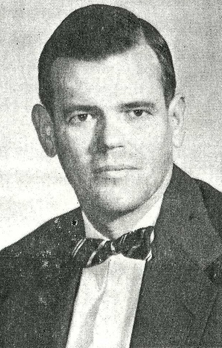
George Franklin Ward (1917-1994)
Inducted 2006
Highlights
Ward attended Auburn University where he received a degree in aeronautical engineering. Ward and his wife, Mary Ellen, helped create educational facilities to serve special needs children in the rural Avon Park area. When the citrus disease Psorosis became a major problem for the industry, Ward freely shared his disease free budwood with other nurseries.
Budwood Registration Program
Florida Citrus Nurserymen’s Association
Florida Citrus Mutual
Psorosis
Bio
George Franklin Ward was born in 1917 in Washington D.C., where his father was serving with the U.S. Department of Agriculture. Not long after his birth, Ward’s family moved to an island located in Florida’s Kissimmee River. He spent the first eight years of his life living in an island community of cowboys known as Kicco. Ward’s father moved their family to Avon Park in 1925 to begin a citrus nursery.
Despite his family’s citrus activities, Ward’s first career was not in the citrus industry. Ward attended Auburn University where he received a degree in aeronautical engineering. Shortly after his graduation he entered the U.S. Army in 1943, where he was assigned work in aeronautical administration. After his service ended, Ward moved to Tampa where he opened and operated a flight service and piloting school. In 1949 a hurricane destroyed the airport he operated from, effectively ending his businesses. Needing a career, Ward returned to Avon Park to work in his father’s nursery.
During this time, Ward married and began a family. When their son was born with Down Syndrome, Ward and his wife, Mary Ellen, helped create educational facilities to serve special needs children in the rural Avon Park area. In 1950 Ward became the sales manager for the family nursery, eventually becoming the president in 1958.
While working in the family nursery, Ward became particularly interested in budwood practices and quickly became knowledgeable in this aspect of citriculture. Ward flourished in his new career; helping to establish the first nurserymen’s association in the state: The Florida Citrus Nurserymen’s Association. While establishing this new organization, Ward served as its temporary chairman and presiding officer. Ward used this group to help foster cooperation and the sharing of ideas between different citrus nurseries in the state. Ward served with Florida Citrus Mutual for a brief time, succeeding Vernon Conner as secretary of the organization.
When the idea of creating a citrus budwood registration program was discussed in the early 1950’s, Ward was an early supporter of this program and eventually became one of the first nurserymen to register. When the citrus disease Psorosis became a major problem for the industry, Ward freely shared his disease free budwood with other nurseries. Swapping of budwood between nurseries became common, prompting Ward to say “Cooperation among nurseries is one of the great things about our organization.”
In August of 1984, tragedy struck 67 year old Ward. Citrus canker was found in his nursery, causing all of his stock and trees to be burned in an eradication effort. Due to state law, other nurseries that had used Ward budwood were burned as well, leading to an estimated 500,000 trees burned. After the destruction of the nursery he worked so hard to maintain, Ward did not want to start anew. But encouragement from others helped Ward gain the courage to start his nursery again. On January 20, 1985, Ward sent a letter to his customers informing them that the nursery would be rebuilt.
Since the rebirth of Ward’s Nursery, he has sent clean, registered budwood around the country and to foreign nations. In 1991 he was awarded an honorary membership into the Florida Citrus Nurserymen’s Association. Ward was honored for his many contributions to the Florida citrus industry in 2006 when he was inducted into the Florida Citrus Hall of Fame.
